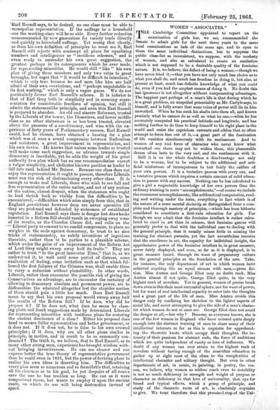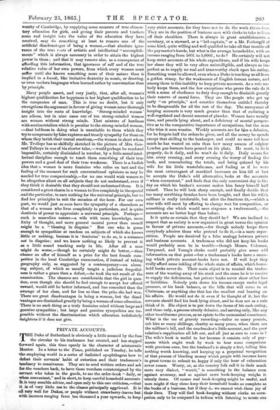WOMEN "ASSOCIATES."
THE Cambridge Committee appointed to report on the examination of girls has, we see, recommended the Senate to admit girls for the next three years to the same local examinations as lads of the same age, and to open to them the same individual distinctions, but to suppress the public class-list as inconsistent, we suppose, with the modesty of women, and also as calculated to create an emulation which is not supposed to be a desirable quality of the feminine nature. It is, we believe, the defect of being a woman,—though we have never tried it,—that you have not only much leas choice as to what you shall do, and much less freedom in doing it, but also, at present at least, much less definite knowledge of what you could do, even if you had the amplest means of doing it. No doubt this last ignorance is not altogether without compensating advantages. The happiest part perhaps of. a man's life is that during which he is a great problem, an unspoiled potentiality as Mr. Carlyle says, to himself, and is fully aware that some veins of power still lie in him unworked. When he has sunk his shafts into them all, and knows precisely what he cannot do as well as what he can,—when he has accurately computed his practical latitude and longitude, and has nothing further to do than to keep himself to his right place in the world and resist the capricious currents and eddies that so often attempt to force him out of it,—a great part of the fascination of life vanishes simultaneously with its restlessness. And to women of any real force of character who never know what unworked ore there may not be within them, this pleasurable dream often lasts to the very end, and the restlessness with it.
Still it is on the whole doubtless a disadvantage not only to be a woman, but to be subject to the additional and arti- ficial misfortune of incompetence to test fairly the calibre of your own powers. It is a tentative process with every one, and a tentative process which requires a certain amount of solid educa- tion to pursue with any success. Nothing can be less calculated to
give a girl a respectable knowledge of her own powers than the ordinary training in mere "accomplishments,"—of course we include the commoner accomplishments, like arithmetical computation, read- ing and writing under the term, everything in fact which is of the nature of a mere mental dexterity as distinguished from a com- plete and thorough mastery of principles, —which has been hitherto considered to constitute a first-rate education for girls. For though we may admit that the feminine intellect is rather calcu- lated to excel in art than in science, that feminine genius will generally prefer to deal with the individual ease to dealing with the general principle, that it visually misses little in missing the training for abstract pursuits, yet the fact nevertheless remains that the excellence in art, the capacity for individual insight, the apprehensive power of the feminine intellect is, in great measure, never fairly displayed, and even, so far as it is displayed, is in great measure lamed, through its want of preparatory culture in the general principles at the foundation of the arts. Take, for instance, the only department of art in which women have achieved anything like an equal success with men,—prose fic- tion. Miss Austen and George Eliot may no doubt rank, Miss Austen almost if not quite, George Eliot quite, in the very highest rank of novelists. Yet in general, women of genius break down even in this their most successful sphere, not for want of power, but for want of real intellectual capacity to enter into the thoughts and a great part of the life of men. Miss Ansten avoids this danger only by confining her sketches to the lighter aspects of social life, and never attempting to give the side of a man's charac- ter which women do not at once see. George Eliot does not avoid the danger at all,—but why? Because, as everyone knows, she is one of the few women in England who* have entered quite deeply enough into the abstract training of men to share many of their intellectual interests so far as this is requisite for apprehend- ing the theoretic knots which occupy their thoughts, the in- tensity of their passions for abstract ends, the force of ambitions which are quite independent of vanity or love of influence. We doubt if any woman can ever attain to the highest rank of novelists without having enough of the masculine education to gather up at sight most of the clues to the complexities of intellectual character and solitary thought. But even in other departments of art, in music, in painting, in poetry, the rea- son, we believe, why women so seldom reach even to notability is not so much deficiency in strength and weight of purpose or character as deficiency in that love of universality, that eye for broad and typical effects, which a grasp of principle, and study of the theoretic roots of art, is absolutely requisite to give. We trust therefore that this promised step of the Uni-, versity of Cambridge, by supplying some measure of true elemen- tary education for girls, and giving their parents and teachers some real insight into the value of the education they have received, may do something at least to remove one of the artificial disadvantages of being a woman,—that absolute igno- rance of the true roots of artistic and intellectual " accomplish- ments" which is always necessary in order to attain the highest power in them ; and that it may remove also, as a consequence of _affording this information, that ignorance of self and of the true relative value of her own powers, from which every woman must *der Amtil she knows something more of their _nature than is implied in a knack, like imitative dexterity in music, or drawing, or even modernianguages when learned rather by conversatien than by principle.
Many people assert, and very justly, that, after all, woman's laighest qualification for hoppiness is her highest qualification to be the companion of man. Tbis is true no doubt, but it only strengthens the argument in favour of giving women some thorough insight into the roots of knowledge. 'Strong-minded women' -are odious, but in nine cases out of ten strong-minded women are women without strong minds. That mixture of hardness with sentimentalism which is peculiar to the strong-minded woraan, —that boldness in doing what is unsuitable to them which they tryto compensate by false_raptures and treacly sympathy for those on Whom they lavish their unreal emotions,--the women in short whom Mr. Trollope has so skilfully ketched in the picture of Mrs. Gen- eral Talboys in one of his shorter tales,— wouldperhaps be rendered impossible, certainly diminished in number, by a little sound intel- lectual discipline enough to teach them something of their true -powers and a good deal of their true weakness. There is a foolish idea that a woman is more feminine who relies on tact and the feeling of the moment for such conversational opiuions as may be /seeded for true companionship,—for no one would wish women to be altogether ilent on all subjects they do not understand, even if they think it desirable that they should not understand them. It is considered a great charm in a woman to live completely in the special .and the particular, to care nothing for the universal principle, but to find her principles to suit the occasion of the hour. For our own part, we would just as soon have the sympathy of a chameleon as that of a woman who lives completely in particulars, and is quite -destitute of power to appreciate ,a universal principle. Perhaps- -such is masculine nature—a wife with more knowledge, more _fixity of thought, and more general mental power than oneself might be a " blessing in disguise." But one who is goose -enough to sympathize at random on subjects of which she knows little or nothing, because it is feminine' to do so, is a nuisance not in disguise ; and we know 'nothing so likely to prevent it as a little sound teaching early in life. After all a man might do worse,—though he certainly might do better,—than -.chance an offer of himself as a prize for the best female com- petitor in the local Cambridge examination, if instead of taking geography only, as suggested by a contemporary—an alarm- ing subject, of which as usually taught a judicious forgetful- ness is rather a grace than a defect,—he took the net result of the examination. The chances are considerable that the girl in ques- tion, even though she should be fool enough to accept her offered reward, would still be better informed, and less conceited than the average of her class, and far less so than the prize she had won. There are great disadvantages in being a woman, but the disad- vantages-are diminished greatly by being a woman of some education. 'There is no such thing as a truly feminine mind without large and _genuine sympathies ; but large and genuine sympathies are im- possible without the discrimination which education indefinitely aheightens if it does not give.



































 Previous page
Previous page